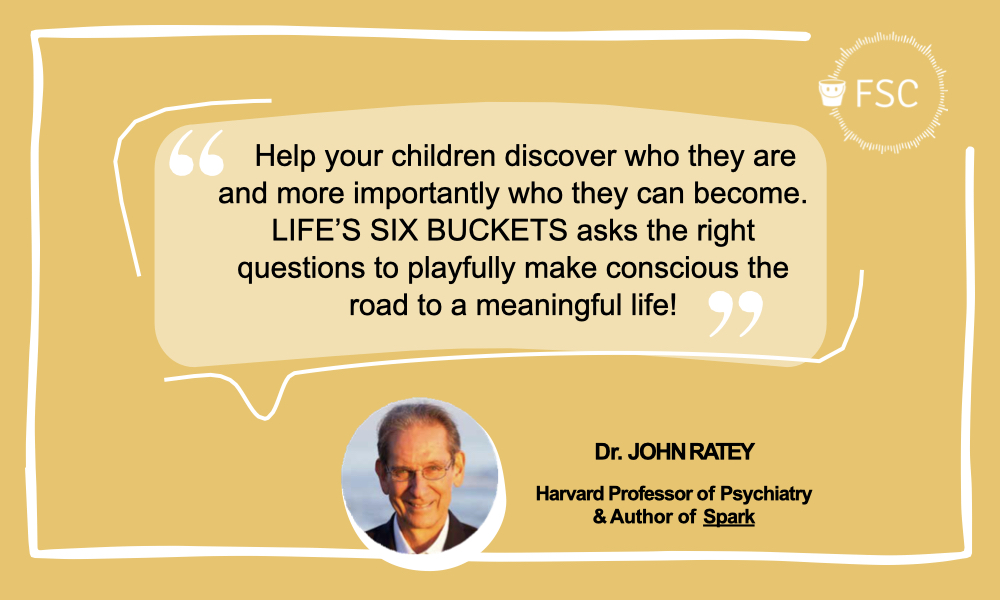Life is changing fast! We need to prepare kids for an AI-fueled future.
Holistic Development: Ensure young people develop crucial life skills alongside academic knowledge.
Personal Growth: Speed young people to become more confident, resilient and adaptable.
Easy to Implement: Simple, ready-to-use resources for your class, camp, home or as supplemental education.
Adaptable Content: Suitable for different learning styles and various learning environments.
Interactive and Fun: Activities that keep brains engaged.
Welcome to the Life's Six Buckets (L6B) Sandbox
Explore L6B & Experience Learning as an Adventure - Firsthand!
Life's Six Buckets for Facilitators
When you are ready to equip your tweens with the skills they need to thrive.
The L6B course fosters self-awareness, adaptability, resilience, and well-being by providing real-life skills and engaging activities tailored to how the brain loves to learn. These adventures can be applied in classrooms, camps or home environments effectively.
The L6B program is designed for rapid onboarding, with experienced teachers able to get started in under 30 minutes and passionate parents feeling confident within an hour. The onboarding video, step-by-step guide, and facilitator walkthroughs are concise and straightforward, ensuring that facilitators can quickly understand and implement the program without feeling overwhelmed.
Absolutely. The L6B program is built with flexibility in mind, allowing teachers to modify activities and approaches to suit the unique needs of each student. Whether students require more visual aids, hands-on activities, or personalized support, L6B provides the structure and resources to accommodate diverse learning styles and abilities.
The L6B program is grounded in a wealth of research and expert insights that demonstrate the effectiveness of our approach:
Movement and Learning: Dr. John Ratey’s research emphasizes how physical activity boosts brain function and enhances learning. Read more about Dr. John Ratey’s work.
Understanding the Brain: Studies show that when students learn about how their brains work, they gain tools to improve their own learning processes. Learn more about the benefits of teaching students about their brains.
Mindset Development: Carol Dweck’s work on growth mindset illustrates how fostering a positive, adaptive mindset leads to better educational outcomes. Explore Carol Dweck’s research on mindset.
The Role of Play: Research underscores the importance of play in cognitive development and social skills, key components integrated into the L6B program. Discover the importance of play in learning.
Active Engagement: Active, hands-on engagement is shown to significantly improve retention and understanding, principles at the core of our program. Read about active learning and its benefits.
Social and Emotional Learning (SEL): CASEL’s extensive research demonstrates the critical importance of integrating social and emotional learning into educational programs, leading to improved student outcomes in both academic performance and overall well-being. The L6B program incorporates SEL principles to help students develop essential life skills. Explore CASEL’s resources.
While TFSC is relatively new, we’ve already gathered positive testimonials and feedback from teachers and students who have participated in the L6B program. These anecdotal accounts highlight improvements in student engagement, self-awareness, and academic performance. As we continue to expand our pilot programs and case studies, we are committed to building a robust body of empirical data to further validate these outcomes.
To make the L6B program accessible, we offer flexible payment options: $25 per student, $500 per class per year, and $1,999 for unlimited access at the school level.
Plus, the first 50 schools to sign up will enjoy early access to the full real-life skills course (60+ adventures) at no cost for two years—a $9,998 value.
Interested in trying a pilot program? Just ask us!
We also have a 30-money back guarantee as well as a Barter Program to ensure finances never get in the way of growth.
The best and most effective way for a parent of a tween to experience L6B is to act as a budding facilitator. This approach, known as the Feynman Technique, is highly effective for learning, benefiting both you and your child. Here’s a simple preparation plan:
- 15 min - Onboarding: Watch a video and take a short quiz.
- 15 min - Preview: Look through the first few pages of the facilitator’s guide and then watch the 1st adventure videos while following along with the guide (~10 minutes).
All interactive questions and activities are provided, so you simply facilitate the adventure. If unsure, practice with a friend. This format is super simple, easy, and very effective. Enjoy learning these skills while having fun!
For a passionate and experienced teacher, L6B is a breeze and needs less than 30 minutes:
- 15 min - Onboarding: Watch a video and take a short quiz.
- 15 min - Preview: Look through the first few pages of the facilitator’s guide and then watch the 1st adventure videos while following along with the guide (~10 minutes).
All interactive questions and activities are provided, it’s easy to customize the pace according to your students needs. This format is super simple, easy, and very effective. Enjoy guiding your students through this engaging and educational experience!
Are there situations where the Life's Six Buckets (L6B) Adventure should not be implemented?
Yes, there are three key "No-Go" situations where L6B is unlikely to be effective:
- Teacher Burnout or Resistance:
- If the teacher is experiencing burnout, lacks motivation, or is resistant to new methods, the L6B Adventure format may not be effective. The program is designed to empower passionate facilitators, and students quickly sense low energy or disengagement from their instructors.
- Inconsistent Implementation:
- Consistency is crucial for success. Implementing the L6B program sporadically, such as only once a month or less, is not effective. Regular and consistent engagement is necessary to achieve the desired outcomes.
- Students Too Young:
- While some younger children might grasp the concepts, the cognitive development required for effective absorption of the L6B skills is typically not fully present in children under 7 years old. Therefore, it's best suited for children aged 7 and above.
Implementing L6B requires motivated facilitators, consistent engagement, and an age-appropriate audience to ensure the best outcomes.




